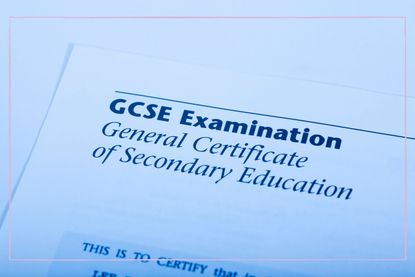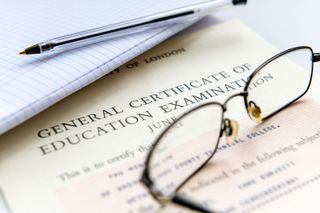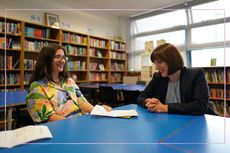GCSE results 2023: When are GCSE certificates issued?
Find out when you can expect to receive GCSE certificate


GCSE results day 2023 is almost here, but once you've got the grades and decided on your next steps, you might find yourself wondering when GCSE certificates are issued.
GCSE results day presents a lot of uncertainty this year, as teacher strikes have disrupted learning and A Level results day saw thousands fewer students in England awarded top grades, following a return to pre-pandemic grading.
Students and parents alike might find themselves asking questions - from how the grading system works to when are GCSE retakes - but if you're wondering when GCSE certificates are issued, we've got all the information you need right here. Read on to find out how long you might have to wait to receive them and what to do if you don't have a copy of your certificates.
When are GCSE certificates issued?
GCSE certificates will be sent to your school two to three months after results day, meaning they should arrive around November time. Most schools will post these to you, but you may have to go in to collect them.
Make sure you do this as soon as possible, as you might need to show them to any future employers or further education establishments, and remember they cost money to replace. If you notice any mistakes you must inform your exams officer as soon as possible, as changes are only free in the first three months of issue.

How long do you have to collect your GCSE certificates?
Your school should let you know if they will be posting your GCSE certificates to you or if you need to collect them. If you are collecting them, make sure you do this as soon as possible - if GCSE certificates are not collected within a year, schools will either send them back to the exam board or destroy them.
Though this should give you plenty of time, if you can’t collect them within the time frame you should contact your secondary school as soon as possible and try to organise a way for them to get your certificates to you.
GoodtoKnow Newsletter
Parenting advice, hot topics, best buys and family finance tips delivered straight to your inbox.
What if I don't have a copy of my GCSE certificates?
If you never received a copy of your GCSE certificates, the first thing you should do is contact your school. However, if you have lost them, you will need to apply for a replacement by visiting your exam board's website.
You can't get a new certificate, but the exam board will instead be able to send you a 'certified statement of results', which should show the same information on it as your exam certificates did and can be used in place of your certificate - for example for a university application.
To do this, you will need to fill out personal information to confirm your identity. Exam boards also require you to pay a mandatory fee of at least £40 for a statement of results.
It can take at least four weeks for your application to be reviewed and approved, followed by further time for the certificates to get sent to you, so make sure you apply as soon as possible - you don't want to be waiting if you have deadlines for university or job applications that you need to meet.
To find out more about getting a replacement exam certificate and contacting the relevant exam boards, visit the gov.uk web page.

How are GCSEs graded in 2023?
In 2023, GCSEs are returning to pre-pandemic standards, meaning national results will be lower than last summer - as we have already seen on A Level results day.
However, this doesn't mean that students aren't protected from disruption. Dr Jo Saxton, the chief regulator of The Office of Qualifications and Examinations Regulation (Ofqual) has said: "I can confirm that, in 2023, we will return to pre-pandemic grading as the next step in getting back to normal. But giving the 2023 cohort some protection against any impact of COVID-19 disruption is the right thing to do.
"We are, therefore, putting in place the same protection that was given for the first cohorts of students taking reformed GCSEs and A levels from 2017 onwards. That meant not disadvantaging students who might have performed less well because they were the first to sit new exams."
Grade boundaries change each year and are recommended by experienced senior examiners - and there is no cap on the number of students that can get a particular grade.
Understanding the grading system
In 2017, a new 9 to 1 scoring system was introduced for the subjects English Literature, English Language and Maths, with 9 at the higher end and 1 at the lowest.
Phasing in over the years, from 2019 the grading system was used on almost all of the subjects on the curriculum, including languages and sciences.
The new system is not being used in Wales, while Northern Ireland uses a mixture of the two systems. Ofqual has assured parents that children would not be disadvantaged by the change.
- 9 = High A* grade
- 8 = Lower A* or high A
- 7 = Lower A grade
- 6 = High B grade
- 5 = Lower B or high C
- 4 = Lower C grade
- 3 = D or high E
- 2 = Lower E or high F
- 1 = Lower F or G
- U = Remains the same
How are marks turned into grades? Ofqual explains. Listen to the full podcast on marking and grading for summer 2022 👉 https://t.co/eJy2asyqDC pic.twitter.com/vTFcAyL5grJune 2, 2022
GCSE results are in: What next?
You'll be able to go into Further Education if you have five or more GCSEs at grade 4 or above. Many sixth-forms and colleges do expect at least four grades, but some schools may take pupils with lower grades, so it's worth giving them a call to check.
If you're unhappy with your results you can resit your GCSEs and these will take place in the school, college or exam centre where you sat the original exam. If you get a higher grade the second time around, you can ask the exam board to provide a new GCSE certificate.
In related news, we've revealed when kids go back to school after the summer holidays, and put together a list of the best back-to-school buys for 2023. We've got the details on some of the best school shoes too.

Ellie is GoodtoKnow’s Family News Editor and covers all the latest trends in the parenting world - from relationship advice and baby names to wellbeing and self-care ideas for busy mums. Ellie is also an NCTJ-qualified journalist and has a distinction in MA Magazine Journalism from Nottingham Trent University and a first-class degree in Journalism from Cardiff University. Previously, Ellie has worked with BBC Good Food, The Big Issue, and the Nottingham Post, as well as freelancing as an arts and entertainment writer alongside her studies. When she’s not got her nose in a book, you’ll probably find Ellie jogging around her local park, indulging in an insta-worthy restaurant, or watching Netflix’s newest true crime documentary.
-
 Compromising may be killing your relationship - here are 5 ways to reach healthy compromises, according to relationship expert
Compromising may be killing your relationship - here are 5 ways to reach healthy compromises, according to relationship expertCompromising isn't always the best way to keep the peace in a relationship
By Charlie Elizabeth Culverhouse Published
-
 Best interactive pets for kids: 15 gift ideas for children of all ages
Best interactive pets for kids: 15 gift ideas for children of all agesFrom puppies to axolotls, take a look at our selection of the best interactive pets you can buy that are sure to be a hit with little animal lovers
By Sarah Handley Published
-
 When will A-Levels be scrapped? Everything to know about the Advanced British Standard
When will A-Levels be scrapped? Everything to know about the Advanced British StandardEverything you need to know about the new qualifications that are set to replace A-Levels.
By Ellie Hutchings Published
-
 When do kids go back to school after the Christmas holidays? 2024 school holiday and term dates
When do kids go back to school after the Christmas holidays? 2024 school holiday and term datesThe key dates that you’ll want to pop on your calendar
By Ellie Hutchings Last updated
-
 How to appeal A Level results and when does clearing open?
How to appeal A Level results and when does clearing open?Find out how to appeal A Level results and when does clearing open with this helpful guide to get you through results day
By Grace Walsh Published
-
 What to expect on A level results day - a parents guide
What to expect on A level results day - a parents guideWe explain what to expect on A level results day, how to understand their results and what to do if they didn't get what they wanted
By Gemma Chandler Published
-
 When do kids break up from school? Summer holidays 2023
When do kids break up from school? Summer holidays 2023It's the final term before the long summer break!
By Emily Stedman Last updated
-
 How to appeal a school place: what to do if your child doesn’t get the school you wanted
How to appeal a school place: what to do if your child doesn’t get the school you wantedGetting your child into the school you really want for them can be a nail-biting time for parents. Here's how to appeal if your child doesn't get in...
By Emily Stedman Published
-
 179 fantastic facts for kids to really blow their mind - from sharks and cats to space and tornadoes
179 fantastic facts for kids to really blow their mind - from sharks and cats to space and tornadoesDazzle and amaze little ones with these mind-blowing facts… They’re so good they’ll leave grown-ups speechless too!
By Joanne Lewsley Last updated
-
 When do you find out about primary school places for 2024? How to find out what school your child got into and what to do if you're not happy with the choice
When do you find out about primary school places for 2024? How to find out what school your child got into and what to do if you're not happy with the choiceWe've shared when find out about primary school places for 2024 how to appeal a decision you're unhappy with.
By Stephanie Lowe Last updated